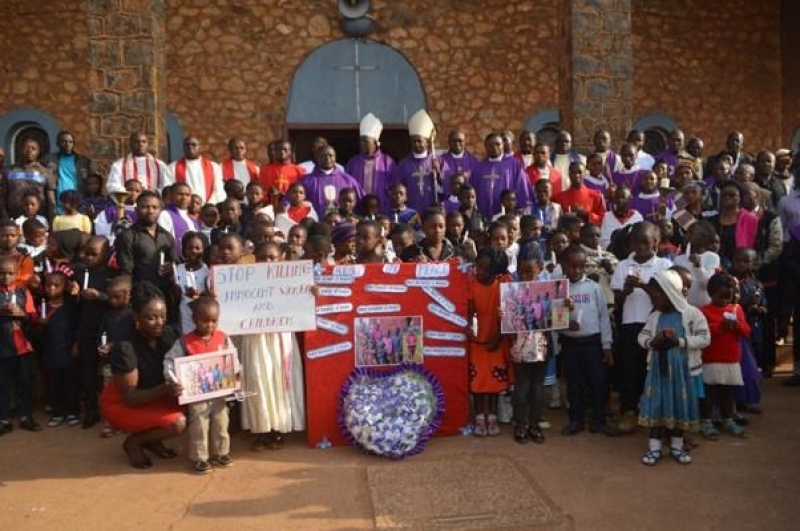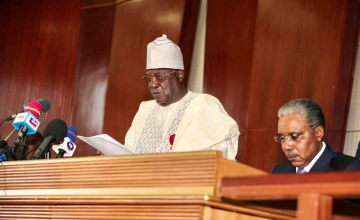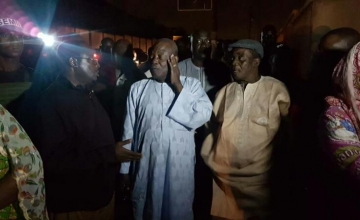
Although Human Rights Watch has not been able to independently verify each case since January 2020, it says it has interviewed, by telephone, 20 victims and witnesses of human rights abuses by armed separatists and government forces between mid-May and early June 2020, as well as 15 family members of victims, residents of the Anglophone regions, doctors, and members of civil society.
Human Rights Watch also reviewed photographs and video footage, which corroborated witnesses’ accounts as violence has also displaced tens of thousands of people in the past two months, adding to the hundreds of thousands who have fled their homes since the conflict began in late 2016.
The international human rights NGO reports in Monday’s dispatch that security forces and armed separatists have both attacked hospitals and medical staff on multiple occasions.
Human Rights Watch regrets that state forces and non-state armed groups have been fighting to outsmart each other in committing atrocities. It recalls that on July 6, separatists killed a Doctors Without Borders community health worker working for in the South-West region, after accusing him of collaborating with the military while Security forces damaged a health facility in the North-West region on June 30 and arbitrarily arrested seven health workers in the South-West region on July 6.
Monday’s dispatch says Cameroonian armed forces have attacked a health facility in the North-West region and arbitrarily arrested seven health workers in the South-West, while armed separatists have killed at least six civilians, including a humanitarian worker and a teacher, since May 2020.
“The violence took place despite peace talks between the government and jailed leaders of the Ambazonia Interim Government (IG), a separatist group, on June 16. Other separatist groups, such as the ‘Ambazonia Governing Council’ and a splinter faction of the IG did not participate,” said HRW.
“The talks between the government and separatist leaders should include ensuring respect for human rights and accountability for abuses,” said Lewis Mudge, Central Africa director at Human Rights Watch. “All parties to the talks should publicly commit to immediately end abuses against civilians and ensure that victims of abuses have access to effective remedies.”
Human Rights Watch has previously called for individual sanctions on members of the military and separatist groups responsible for grave abuses in the Anglophone regions.
“On June 10, at 2 p.m., following clashes between separatists and soldiers, including some from the Rapid Intervention Battalion (BIR), a grenade was fired into the courtyard of the district hospital in Bali, North-West region, leading to the death of one cardiac patient, injuring at least four others, and destroying four vehicles.” Human Rights Watch said it spoke to two medical staff and three Bali residents and reviewed a letter sent by the hospital director to the health minister, the Bali military commander and the separatists’ commander describing the attack.
Monday’s report reads further: “The Bali military commander paid 50,000 XAF (US$86) to the hospital for damages. This is not the first time that this particular hospital has been targeted in fighting between separatist fighters and Cameroon armed forces. In 2018, separatists looted hospital supplies. In July 2019, a grenade, allegedly fired by the military, injured a patient and destroyed the roof. In January 2020, soldiers forcibly entered the hospital looking for wounded separatists causing panic among patients.
“Separatists killed at least six civilians since mid-May, including a 58-year-old teacher working at the University of Bameda in the North-West region on May 17.
“A family member of the teacher told Human Rights Watch that separatists had repeatedly threatened him to make him stop teaching, considering him a traitor for not complying with their demands to boycott schools. The teacher told the separatists that he needed to work to make a living, so they instead demanded money, which he could not pay.
“A witness to the killing said that he saw two separatist fighters approach the teacher as he was leaving his home and shot him three times. “I was standing nearby,” the witness said, “The Amba [armed separatists] came on a motorbike and said to him, ‘You are stubborn. Your end has come.’ Then, they shot him once in the head and twice in the chest. He fell on the ground in a pool of blood.”
“Since 2017, armed separatist groups have waged a violent campaign against education, enforcing a boycott of schools in the two Anglophone regions to protest against what they consider educational injustices against English-speakers. They have regularly targeted school buildings, burning and damaging scores of schools. They have killed, kidnapped, and maimed students and education officials for not complying with their demands to keep schools shut. They have used schools as bases, deploying fighters and weapons in and near them and torturing hostages in classrooms.
“Separatists have disrupted normal life in the areas they control by enforcing prolonged lockdowns, calling strikes, and building roadblocks that are affecting the delivery of humanitarian assistance. The United Nations Office for the Coordination of Humanitarian Affairs (OCHA) reported that separatists’ roadblocks are hindering the transport of medical supplies to the Banso Baptist Hospital in Kumbo, a key facility for tens of thousands of people in one of the areas most affected by violence in the North-West region.
“In July, Human Rights Watch contacted representatives of three separatist groups, the IG, led by Sisiku Julius Ayuk Tabe, its splinter faction, led by Samuel Ikome Sako, and the ‘Ambazonia Governing Council.’ All denied that their fighters had committed any of these abuses.
“Cameroon’s international partners and the UN Security Council should help civilians in the Anglophone regions who are facing violence on a daily basis, and demand government forces and separatists stop attacks on civilian targets,” Mudge said. “They should impose targeted sanctions, including travel bans and asset freezes, on separatist leaders responsible for abuses and consider the same for government forces involved in abuses.”














